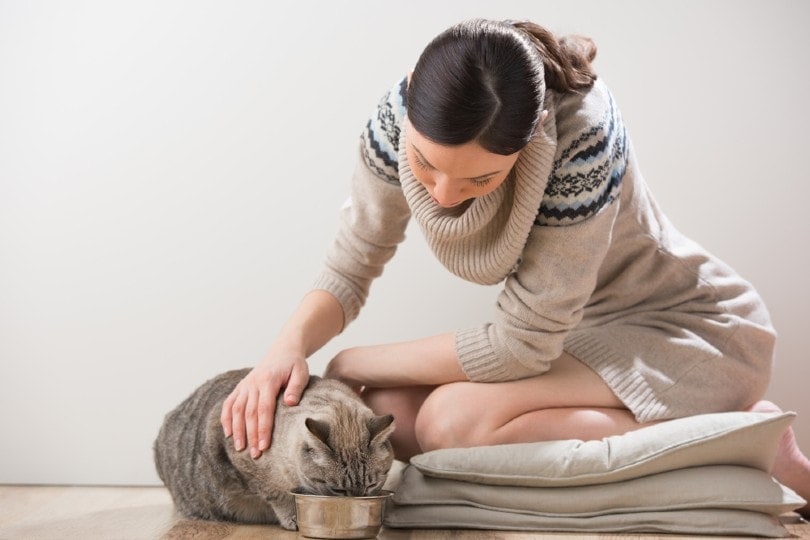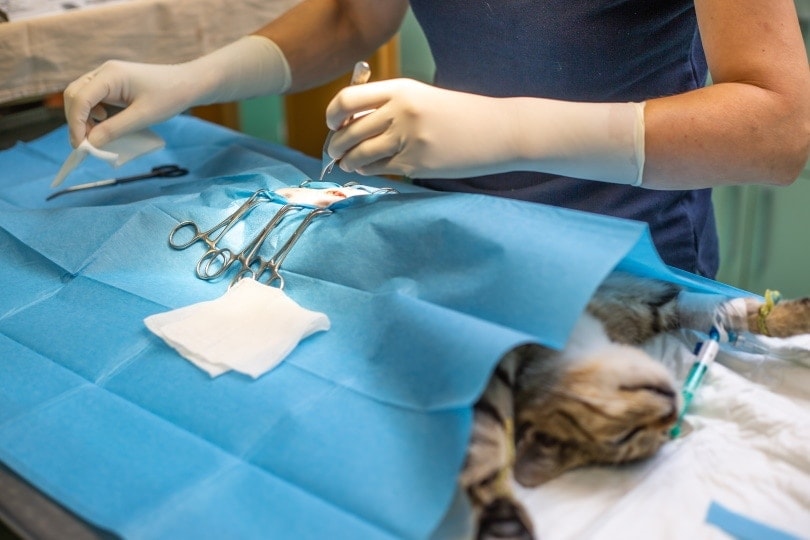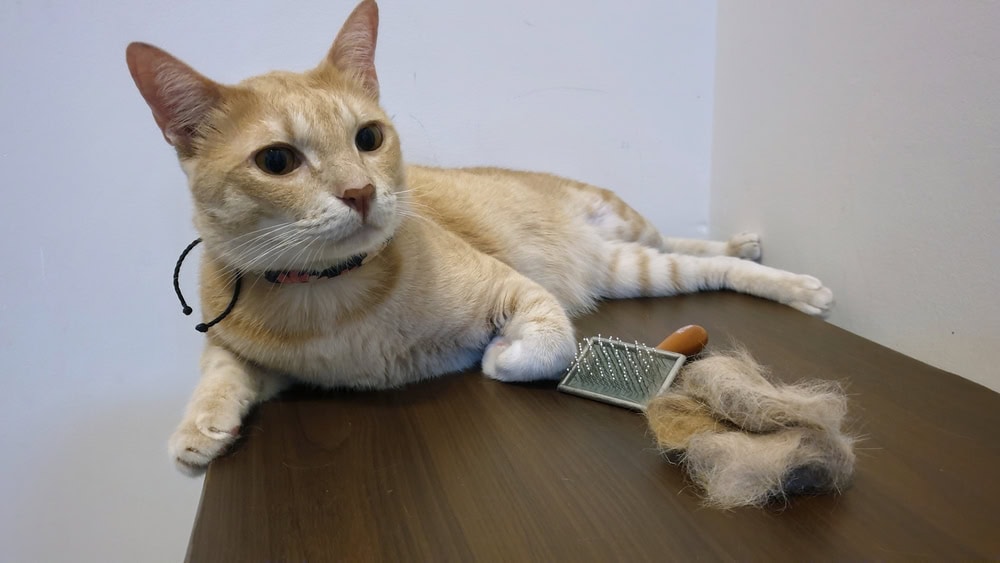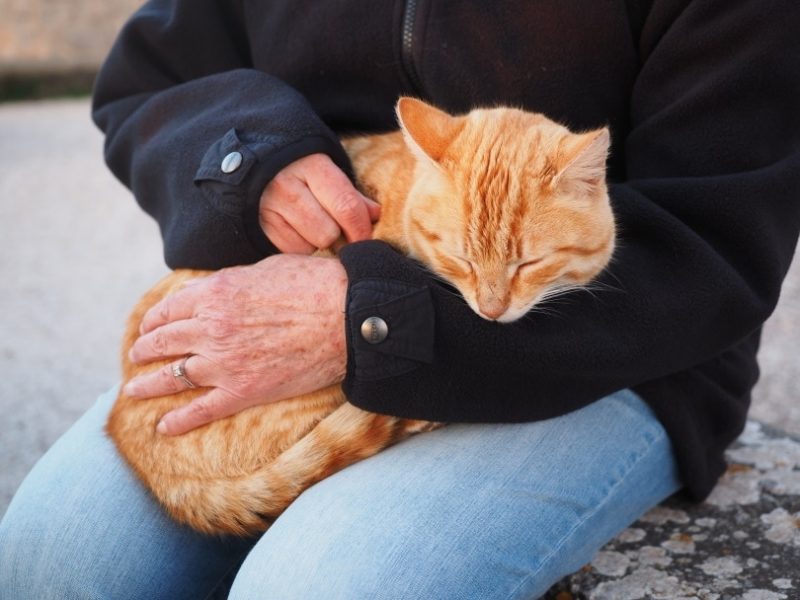Can Cats Eat & Drink Before Getting Spayed or Neutered? Vet-Approved Info & Recommendations
Updated on

Spaying or neutering your cat is a safe, simple procedure. However, as a pet parent, you probably have quite a few questions. You might even wonder if your cat can eat or drink before having the surgery performed. The answer is that it mostly depends on your cat’s age and your vet’s advice. Younger cats are usually allowed a small meal in the morning of their procedure. Healthy adult cats are usually not fed overnight the day before their procedure. We’ll explain why below and discuss the benefits of the procedure.
Please note that in some parts of the world (including the US), the term “neuter” is used interchangeably with castration, or the removal of the testicles for a male animal. The word isn’t a sex-specific term though, and the author’s use of the word neuter in this article is merely a stylistic choice to refer to castration.
Can Cats Eat & Drink Before Getting Spayed or Neutered?
There is no straightforward answer to this question, and recommendations vary from one veterinarian to another. However, the general consensus is that a young kitten should be allowed to eat a small meal, about half or a quarter of their usual breakfast portion, the morning of the procedure. This is because a younger kitten has a reduced ability to fast, and veterinarians likely do not want your kitten to experience hypoglycemia (low blood glucose).
Healthy adult cats, on other hand, can be made to fast overnight the day before their procedure. This usually happens by offering your pet their dinner and then not feeding them anything until the procedure.
Most cats can be offered water up until their procedure. However, at times, your veterinarian may instruct you to withhold water for a few hours before the procedure. Again, as recommendations vary, and it’s best to follow your veterinarian’s guidelines on the matter.
The reason veterinarians advise fasting your pet is because anesthetic drugs often cause nausea. If your cat had a recent meal, they may vomit once they’re given the anesthetic. This is definitely not desired, as a sedated animal may have some of the ejected vomit enter their trachea, which can lead to a condition known as aspiration pneumonia.
An Overview of Neutering & Spaying
Neutering or spaying your cat is an operation that prevents pregnancy in females and the ability to get a cat pregnant in males. The ideal age to spay or neuter your pet is also something that’s not consistently agreed upon by veterinarians. Though there are some recommendations for early procedures (at the age of around 4 months), other veterinarians may recommend a different age for your pet’s procedure. This often factors in issues like your pet’s weight, health, and pregnancy status.

How Much Does Cat Neutering Cost?
The cost of getting a cat neutered will depend on the area you live in, whether your cat is a female or a male, and what the individual vet’s fees are. You can expect to pay between $100 and $400 at a veterinary clinic, but some organizations charge low prices when holding spaying and neutering events.
What Are the Benefits of Spaying or Neutering Your Cats?
There are quite a few benefits of spaying or neutering your cats.
- Reduces the cat’s desire to roam
- Reduces sex-hormone related aggression
- Reduces sex-hormone driven fighting
- Reduces the risk of some diseases, such as FIV (feline immunodeficiency virus)
- Helps to prevent testicular cancer
- Reduces the chance of being struck by a car during roaming
- May reduce incidences of spraying
- Prevents your cat from becoming pregnant
- Prevents issues of the uterus, such as pyometra
- Prevents ovarian issues
- Earlier procedures have added health benefits, such as reducing the incidences of some cancers
- Stops the cat from going into heat and the associated unwanted behaviors associated with heat
- Reduces the cat’s urge to run away while in heat to mate
- Your cat will attract fewer or no males to the house
 FAQ
FAQ
Now that you know when your cat can eat before being spayed or neutered, we’ll answer a few of the most common questions about cats and this type of surgery below.
Will My Cat Get Fat?
A cat that’s spayed or neutered has a slightly lower caloric need than a cat that isn’t. This requires a slight adjustment in the portions of their meals. The lack of sex-hormones may lead to more fat deposition in the body; however, it doesn’t necessarily mean your cat will get fat, especially if they’re fed controlled amounts of portions and exercise regularly.
Do You Need to Neuter an Indoor Cat?
Yes, you should still have your indoor cat neutered. You never know what will happen, and your cat could easily slip out. Not only does it stop female cats from going into season, but it also cuts down on certain unwanted behaviors in both female and male cats. In reality, it’s just better for your cat’s health and your home environment to have your cat fixed.

Will Neutering Stop a Cat From Spraying?
While it’s not guaranteed, neutering often stops a male cat from spraying or marking his territory. It is possible that the cat will still spray if it’s upset or anxious about something. However, if your cat stopped spraying and then started again, talk to your vet to determine the cause of the problem.
Conclusion
Cats can sometimes eat before being spayed and neutered, but there are limitations to how much they can eat and at what age. You can usually give them water up until the surgery time. However, if you’re worried about how much you can feed your cat, it’s best to ask your vet when you go in to make the appointment.
While you can have cats neutered or spayed at 4 months of age, your vet will let you know when it’s time, as recommendations may vary depending on your cat’s circumstances and overall health.
See Also:
Featured Image Credit: Milles Studio, Shutterstock












